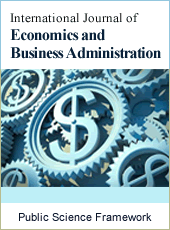International Journal of Economics and Business Administration
Articles Information
International Journal of Economics and Business Administration, Vol.6, No.1, Mar. 2020, Pub. Date: Feb. 14, 2020
Effect of Government Expenditure on Economic Growth in Nigeria (1986-2018)
Pages: 12-17 Views: 1938 Downloads: 528
[01]
Muhammad Dahir Ahmad, Department of Economics and Management Science, Nigeria Police Academy, Wudil-Kano, Nigeria.
[02]
Yunana Yakubu Aku, Department of Political Science, Faculty of Social Sciences, Nasarawa State University, Keffi, Nigeria.
[03]
Wada Mato Rantan, Department of Economics and Management Science, Nigeria Police Academy, Wudil-Kano, Nigeria.
[04]
Yunana Titus Wuyah, Department of Economics and Management Science, Nigeria Police Academy, Wudil-Kano, Nigeria.
Despite the rise in government expenditure in Nigeria over the years, there are still public outcries over decaying infrastructural facilities, low gross domestic product, and general economy stagnation. This study investigates the effect of government expenditure on economic growth in Nigeria using time series data spanning 1986-2018. The data were sourced from Central Bank of Nigeria Statistical bulletin for various years. The data were subjected to unit root test and co-integration. Ordinary Least Squared Regression technique was carried out to see the effect of government expenditure on economic growth during the period under review. The explanatory variables in the model are government capital expenditure (GCE), government recurrent expenditure (GRE), money supply (MS), gross fixed capital formation (GFCF) and labour force participation rate (LAF) while the dependent variable is economic growth proxy by gross domestic product (GDP). The unit root result reveal that GDP, GRE, MS and LABF were stationary after first difference while GCE and GFCF were stationary at levels. Co-integration result also indicates that trace and maximum eigen-value statistics show the null-hypothesis of co-integrating is rejected at both 5% and 1% levels of significance. The trace test suggests two co-integrating equations at 5% and one co-integrating equation at 1% while the maximum eigen-value statistics suggests one co-integrating equations at both 5% and 1% levels of significance. Since there is an indication of at least two to three co-integration equations out of five, we conclude that there exists a long run equilibrium relationship between government expenditure and economic growth in Nigeria. Finally, the regression results reveal that government capital expenditure and government recurrent expenditure has a positive and significant impact on economic growth. Government expenditure drives economic growth in Nigeria and the study recommends that more of government’s resources should be directed to especially capital expenditure and recurrent expenditure in terms of income to increase aggregate demand.
Government, Expenditure, Economic Growth, Capita, Recurrent
[01]
Abu, N. and Abdulahi, U. (2010). “Government Expenditure and Economic Growth in Nigeria, 1970-2008: A Disaggregated Analysis”, Business and Economic Journal, 4 (3): 237-330. Available at: http://astoujournals/com.
[02]
World Bank (1996). World Development Report.
[03]
Nurudeen A. and Usman A. (2010). Government Expenditure and Economic Growth in Nigeria, 1970-2008: A Disaggregated Analysis, Business and Economics Journal, Volume 2010: BEJ-4.
[04]
Barro, R. J., (1990). Government spending in a simple model of endogenous growth. Journalof Political Economy, 98 (5): 103-125.
[05]
Barro R, Sala-i-Martin X, (1992). Public Finance in Models of Economic Growth. Review of Economic Studies, 59: 645-661.
[06]
Roux, A, (1994). Defence, Human Capital and Economic Development in South Africa”, African Defence Review, No 19.
[07]
Okojie, C. E. E, (1995). Human Capital Formation for Productivity Growth in Nigeria, Nigerian Economic and Financial Review, June, pp. 44-5.
[08]
Glomm, J. J. and Ravikumar, D. J. (1997). “The Growth of Public Expenditure in Selected Developing Nations: Six Caribbean Countries”, Public Finance/Finances Publique, 3 (3): 57-74.
[09]
Jelilov, Gylych; Onder, Evren. (2016). Entrepreneurship: Issues and Solutions Evidence From Nigeria. Pyrex Journal of Business and Finance Management Research, 10-013.
[10]
Olugbenga, A. O., and Owoye, O. (2007). Public Expenditure and Economic Growth: New Evidence.
[11]
Jelilov, Gylych; Musa, Muhammad (2015). The impact of government expenditure on economic growth in Nigeria. Sacha Journal of policy and strategic studies, 15-23.
[12]
Brown, C. V. and P. M. Jackson (1994): Public Sector Economics. Black well Publishers U K.
[13]
Okoro, A. (2013). Government Spending and Economic Growth in Nigeria. Global Journal of Management and Business Research Economics and Commerce.
[14]
Ogundipe, A. A. (2013). Government Spending and Economic Growth in Nigeria: Evidence from disaggregated analysis. Journal of Business Management and Applied Economics.
[15]
Olopade B. C and Olapade. D. O (2010). The impact Growth and Development in Developing Countries: Nigeria as a case study. Olorunfemi, S. (2008). “Public Investment and Economic Growth in Nigeria: An Autoregressive model”, Journal of international Finance and Economics.
[16]
Olorunfemi S. (2008). Impact of government expenditure on economic growth in Nigeria: An Autoregressive model”, Journal of international Finance and Economics.
[17]
Mitchel, J. D. (2005). The Impact of Government Spending on Economic Growth”, Available at: www.heritage.org.
[18]
Gemmell, N. and Kneller R. (2001). The Impact of Fiscal Policy on Long Run Growth, European Economy, London.

ISSN Print: 2381-7356
ISSN Online: 2381-7364
Current Issue:
Vol. 7, Issue 4, December Submit a Manuscript Join Editorial Board Join Reviewer Team
ISSN Online: 2381-7364
Current Issue:
Vol. 7, Issue 4, December Submit a Manuscript Join Editorial Board Join Reviewer Team
| About This Journal |
| All Issues |
| Open Access |
| Indexing |
| Payment Information |
| Author Guidelines |
| Review Process |
| Publication Ethics |
| Editorial Board |
| Peer Reviewers |


